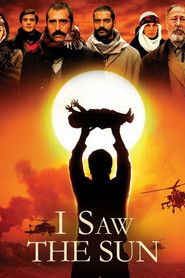“I Saw the Sun” is a dramatic Turkish film about a family struggling to survive against the harsh realities of poverty. The movie is a powerful metaphor for the endurance of the human spirit, and how even in the darkest of times, hope can still shine through. With stunning visuals and emotional performances, this movie will leave you feeling both inspired and heartbroken.

CLICK HERE↓↓↓📺_Watch I Saw the Sun 2009 English Subtitles_
Review
I Saw the Sun
An Ode to the Brains behind Turkish Cinema
In a world of romantic comedies, sci-fi thrillers, and action-packed blockbusters, it’s not often that a movie comes along that is so uniquely moving that its story stays with you long after the final credits roll. Such a movie exists in “I Saw the Sun,” a film by director Mahsun Kırmızıgül.
The movie tells the story of a Kurdish family living in southeastern Turkey. The father, Şevket (Mahsun Kırmızıgül), is a modest farmer who loves his wife and children deeply. His eldest son, İbrahim (Yavuz Bingöl), has just been released from prison. His second son, Mert (Arif Erkin Güzelbeyoğlu), has found a job in Istanbul and wants to move out of their village. And his youngest son, Yusuf (Murat Ünalmış), is still in school.
As the family gathers for Şevket’s birthday celebration, tensions run high as İbrahim’s release from prison begins to reveal some dark secrets held by the family.
The film is an emotional tribute to Turkey’s rural life and Kurdish culture. It portrays an utterly different side of Turkish society – one that is seldom seen or discussed – making it brave and essential viewing for those wanting to broaden their understanding of Turkey’s complex identity.
Kırmızıgül masterfully crafts an immersive experience with stunning visuals supported by an evocative soundtrack; he transports viewers to rural Turkey with beautiful shots of sunrises over vast fields and mountains. The film takes its time building up its world while focusing on developing characters whose pain will crush your heart when they start unraveling their secrets.
Shot entirely on location in Muş province, Southeastern Turkey, I Saw the Sun takes advantage of the country’s natural beauty and captivating landscape. The cinematography is breathtaking, with the camera lingering over minute details of the village that add up to create an atmosphere that is both inviting and utterly alien.
The movie has a talented cast of actors who bring their A-game to make the audience connect with their characters’ emotions. They effortlessly inhabit complex roles, fleshing them out with nuance and depth; it’s nearly impossible not to become invested in their stories.
Yavuz Bingöl gives an intense performance as İbrahim, whose time in prison has unleashed a deeply troubled soul. His portrayal of a man struggling with guilt and redemption will leave you in awe.
Equally impressive is Mahsun Kırmızıgül’s turn as Şevket. He conveys all the complexities of his character’s love for family, duty to his traditions, and desire for a better life. Kırmızıgül puts his heart into this role – also writing and directing the film – making it one of Turkey’s greatest cinematic achievements.
Arif Erkin Güzelbeyoğlu’s Mert provides comic relief without detracting from the film’s more serious themes, while Murat Ünalmış lends integrity to his role as the youngest son struggling with his identity in a world where so much is at stake.
The dialogue between characters is gripping yet subtle enough to allow natural reactions to be captured on screen. What’s particularly impressive about I Saw the Sun is that it doesn’t shy away from provoking discussions about cultural identities, communal tensions, social hierarchies, and even homosexuality—all while maintaining its intimate focus on this one family dynamic.
I Saw the Sun premiered at Cannes Film Festival in 2009 and was widely celebrated by critics worldwide. Its gently subversive take on tradition received accolades for its fresh perspective on Turkish cinema, both storytelling techniques and use of actors who spoke Kurdish throughout.
The movie was Turkey’s official entry for the Best Foreign Language Film category of the 83rd Academy Awards, but it did not make it to the final selection. Nonetheless, I Saw the Sun won several local awards, including Best Director and Best Actor at the Istanbul International Film Festival.
It’s impossible to discuss I Saw the Sun without mentioning Kırmızıgül’s passion project; throughout his career, he has been dedicated to providing a voice for underprivileged groups and exploring stories that challenge cultural norms.
“I Saw the Sun” has a heart that beats with vitality and optimism, as it tells an unflinching story that deserves to be seen. In a world where cultural taboos dominate traditional storytelling in Turkish cinema, this movie stands out as one of those rare jewels that provide an essential glimpse into lives less-explored.
In essence, “I Saw the Sun” is an ode to its cast of characters who face incredible odds in their quest for freedom. The film’s elegant fusion of old and new subverts cliches about rural life in Turkey. It’s a movie whose themes—family ties, loyalty, sacrifice, perseverance—are timeless and universal. It will leave you feeling elevated yet grounded – moved by its message – and grateful for having gained such extraordinary insight into another culture.
Technical Data

- Runtime : 115
- Release : 2009-03-13
- Genre : Drama
- Cast : Mahsun Kırmızıgül as Ramo, Demet Evgar as Havar, Murat Ünalmış as Mamo, Altan Erkekli as Davut, Erol Demiröz as Haydar
- Crew : Mahsun Kırmızıgül as Director, Mahsun Kırmızıgül as Writer
- Popularity 3.553
- Budget : 0
- Revenue : 0
- Company : Boyut Film
- Summary : In the southeast region of Turkey, the Altun family lives in a small mountainside village plagued by a 25-year war, making their daily life a hellish struggle. As the war continues to intensify, the family is forced to migrate west to the city of Istanbul. While Haydar and Isa Altun decide to stay in Turkey with their young children, Davut Altun and his family migrate north to Norway, enlisting the help of smugglers. They eventually reach their destination and find work in a supermarket, but life as refugees proves relentless. Back in Istanbul, Haydar watches over the family as his wife undergoes an operation due to pregnancy complications. Their son makes friends with a group of transvestites, helping him to understand why he has felt different all of his life. While liberating, his newfound identity is seen as a disgrace to the rest of his family, leading him to flee from the abuse it produces.
- Tagline : Children here don’t shape their own destiny.
